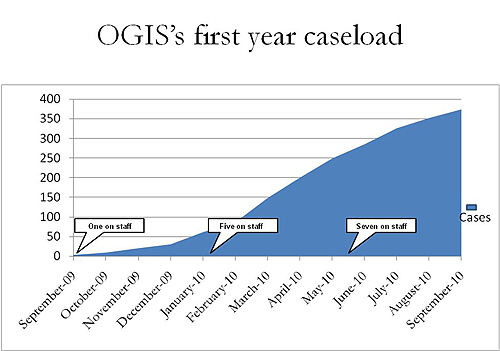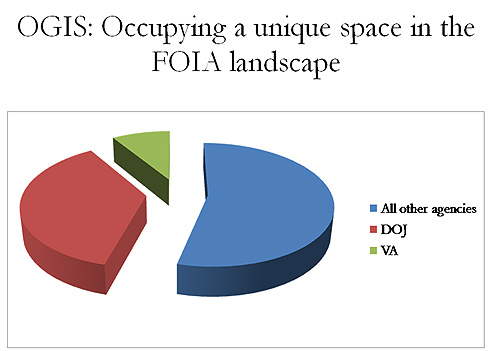
OGIS: First Year in Review
The Office of Government Information Services (OGIS) opened its doors in September, 2009, with one staff member, a stack of cases awaiting resolution, and one very big mandate - to provide mediation services to resolve disputes between FOIA requesters and agencies, and to review agency compliance with FOIA.
From that mandate grew OGIS's guiding principles. Those are:
- OGIS advocates for a fair FOIA process and for improving FOIA;
- OGIS's work must complement agency practice without making the process more burdensome;
- OGIS exists as a resource for requesters to help them navigate the FOIA landscape and for agencies to help improve their FOIA practices; and
- FOIA Public Liaisons are essential to improving FOIA administration and OGIS must support them and promote their role
Much has changed for OGIS in the last year. Here are a few highlights from the office's first year.
Staffing
Director Miriam Nisbet, an expert in information policy law with a distinguished career both within and outside of the Federal government, assembled a diverse staff. OGIS's seven staff members come from both the agency access and the FOIA requester communities and have expertise in FOIA, open government, information science, journalism and database analysis.

Congressional Testimony
Director Nisbet testified twice before Congress in OGIS's first year. In September 2009, she testified before the Senate Judiciary Committee at a hearing entitled "Advancing Freedom of Information in the New Era of Responsibility." In March 2010, Director Nisbet presented before the House Committee on Oversight and Government Reform's Information Policy, Census and National Archives Subcommittee.
Resolving Disputes
The first inquiries seeking assistance from OGIS awaited Director Nisbet on her first day. Within the year, the OGIS caseload, which includes both requests for dispute resolution as well as more general inquiries, swelled to more than 380 cases from 40 states, the District of Columbia and seven countries. OGIS has employed a variety of techniques to resolve these disputes, from ombuds service to facilitation. Nearly a quarter of these cases involved Privacy Act, or first-party, requests, which fall outside the scope of the OGIS mission; however, in many of those cases, the Office successfully assisted those requesters with determining the status of their requests or appeals.
While OGIS encourages all Federal agencies to inform requesters about OGIS and the services it provides, this did not occur uniformly in OGIS's first year. A handful of agencies (including the Department of Veterans Affairs and the Department of Justice) began using response letters and appeal letters to inform their FOIA requesters about OGIS and its mission soon after the offices opened; other agencies have begun to follow suit.

Training
Although most Federal agencies have active and effective Alternative Dispute Resolution (ADR) programs, applying mediation principles and techniques to FOIA disputes is relatively novel. OGIS views agency ADR programs as a great untapped resource to help extend the Office's reach by leveraging existing agency resources to help resolve FOIA disputes.
Working with the ADR staff of the Federal Energy Regulatory Commission (FERC), OGIS has developed and presented two dispute resolution skills training sessions for FOIA professionals. These sessions were co-sponsored by OGIS and the Department of Justice, Office of Information Policy (OIP).
Looking Ahead
In its second year, OGIS plans to better educate FOIA requesters, implement a comprehensive plan for reviewing agency FOIA policies and procedures, regularly offer dispute resolution skills training, establish a permanent case management system and develop measures of effectiveness of a fully operational mediation program. Meeting these objectives will help us implement fully OGIS's mission to improve the FOIA process as well as realize President Obama's Open Government initiative and his January 21, 2009 FOIA Memorandum.